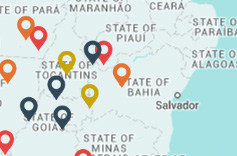Odara – Institute of the Black Woman
"An Amazing Goal" - Black Women discussing the World Cup General Law and scoring a goal!
Bahia
Objectives and target population:
The project aims to guarantee the right of black street vendors to sell their products in FIFA’s areas of influence during the 2014 World Cup in Salvador. The strategy is to insert them into discussions and decisions about the projects for the mega-event and its impact on the lives of the population, so that they can fight for those rights.
The initiative ratifies one of the goals of the Popular World Cup Committee, which is to demand the adoption of an inclusive productive policy, based on the principles of decent work, solidarity economies, community tourism, selective collection of disposed items, street commerce and the value of black street vendor women culture in Salvador.
Around 125 women will directly benefit from the program, along with 725 children and adolescents—the sons and daughters of these women.
Main activities:
Ten workshops will be realized in various locations on the theme “Citizenship for Black Woman Street Vendors,” the activities for which will be divided in stages:
– 1st Stage: Mobilization of black women’s organizations to enroll the beneficiaries; and networking with partners – the Public Prosecutor, Popular World Cup Committee, Ombudsman of the Public Defender;
– 2nd Stage: Holding workshops with presentations on the fundamental concepts of human rights and identification of the violations suffered by the group, from the perspective of gender and race;
– 3rd Stage: Discussion Circles with the women participating in the workshops and representatives of the Popular World Cup Committee, Public Defender Ombudsman and Public Prosecutor;
– 4th Stage: Elaboration and distribution of an illustrative booklet, in the popular vernacular, on the World Cup General Law, with the disclosure of locations and telephone numbers for reporting on human rights violations.
Context:
The World Cup General Law project, which regulates the commercial rights of FIFA during the 2014 World Cup, creates a context of exception. These exceptional legal and administrative alterations include the exclusivity in publication, advertising, sales and distribution of products, services and trademarks related to the sporting event.
A large number of street vendor women will be directly impacted by this law, prohibited from selling any product that mentions the World Cup inside of so-called Restricted Commerce Areas—stadiums, their surroundings and access routes. Besides creating a monopoly, the measure restricts the freedom of choice, a right guaranteed by the Consumer Defense Code.
Sesp – the Salvador Secretary of Public Services estimates that there are roughly 10,600 licensed street vendors in the Bahian capital. This number could triple when unregistered sellers are taken into account. The number can be explained by the high unemployment rate in the city which, according to the Superintendent for Economic and Social Studies of Bahia, reached 19% of the population in February, 2012, with 69% of that, women.
The Popular World Cup Committee intends to protest the unconstitutionality of the General Law, signed by president Dilma Rousseff in June, 2012.
About the organization:
Founded in August of 2010, Odara – Institute of the Black Woman is a consortium of five feminist organizations for black women: N’zinga – Black Women’s Collective, Women’s Rebirth Association, I’m Divine, Uniart and Obirinlá, which looks to overcome discrimination and prejudice, as well as seeking alternatives that allow for socio-political and economic inclusion for afro-descendant women and their families in society.
The group holds training and mobilization programs from the perspective of human rights; black women’s health and reproductive rights; job and salary creation and productive inclusion; research for theoretical/scientific support and subsidies for proposing policies; and communications.
Partnerships:
Odara is affiliated with the National Feminist Network for Health and Reproductive Rights; the Afro-Caribbean and Afro-Latina Women’s Network; the Black Brazilian Women’s Network; the Rio de Janeiro Healthy Communities Network; and the Network of World Cup Legacy in Salvador.
Funding Line
Annual Call for Proposals
Year
-
Total Granted
-
Duration
-
Main Themes
The right to just and sustainable cities






